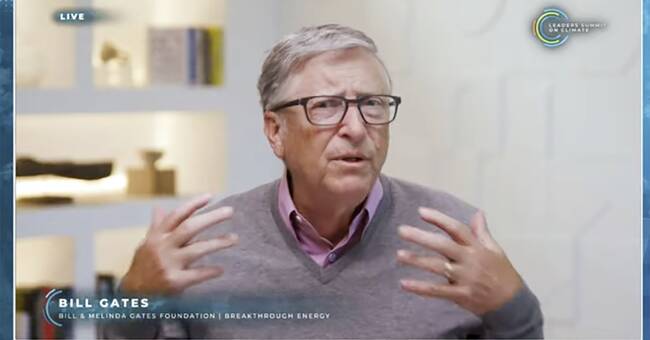Joe Biden is driven by a deep conviction.
The climate crisis holds a fantastic opportunity to benefit the American economy and create new green jobs, which are also "union-friendly", he usually adds.
He is investing an incredible $ 2,000 billion in an infrastructure package to create new green jobs as fossil fuels disappear in the coal and rust belt.
The criticism that the green jobs will hardly appear in the communities where the coal mine is closed down, he waves away.
Today, Biden took the help of a number of top names to sell the climate crisis as an opportunity for the business community.
Hooked arm with business
Philanthropist Bill Gates gave a speech on which industries have not yet seen the light of day in renewable energy.
He himself has invested over two billion dollars in developing carbon dioxide-free energy types.
Prime Minister Stefan Löfven did not receive an invitation, but instead Vattenfall's CEO Anna Borg, to talk about Sweden's world-unique development of fossil-free steel.
The climate summit was a demonstration of how politicians can join forces with the business community.
To date, almost 3,000 large companies in the world have delivered their own climate targets when they are to be climate neutral.
One example is how the hamburger chain Burger King announced earlier this week that it will reduce its carbon dioxide emissions by 41 percent by 2030, among other things by selling less meat products and more vegan.
Entrepreneur and Tesla CEO Elon Musk yesterday announced a four-year climate competition with $ 100 million in prize money to those who can show how to remove carbon dioxide from the atmosphere.
That he then intends to invest in such a commercially profitable technology is not a wild guess.
Business and politicians face an almost inconceivable challenge.
80% of the world's industries and transport industries are still powered by oil and coal.
The global warming curve is still pointing steadily upwards.
According to a report from Fair Finance Guide, Swedish banks, among other things, still lend money to companies that, among other things, drill for new oil in the Arctic.
John Kerry, the White House's climate envoy, called on banks to join the ranks of investors investing in fossil fuels.
Historically sharp climate promise
So what has changed?
What is new is that in the last 12 months, the world's three largest economies - the EU, the USA and China - have set a stop date for oil and coal.
It's historic.
And when politicians suddenly start delivering decisions to phase out oil and coal, things start to happen.
Even if the end dates are far away, it will be a clear signal for the business community to re-evaluate investments and make other risk assessments.
Suddenly, holding fossil shares can prove to be associated with greater risk in the long term than investing in a green start-up company.
The United States is now back on the global climate scene with full force.
Thanks to the White House coming up with a historically sharp climate promise, they won the confidence of the outside world.
However, a bitter battle with the Republicans awaits at home, which accuses Joe Biden of giving China enormous competitive advantages by leading the way in climate change.
But even if the emissions giants China and India did not make any new promises, the great powers are talking to each other again about the climate crisis.
It's beautiful so.

